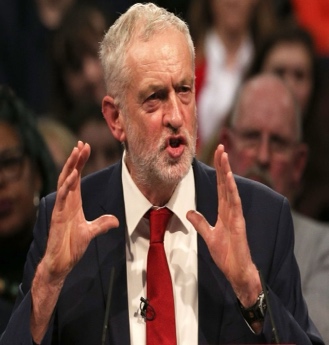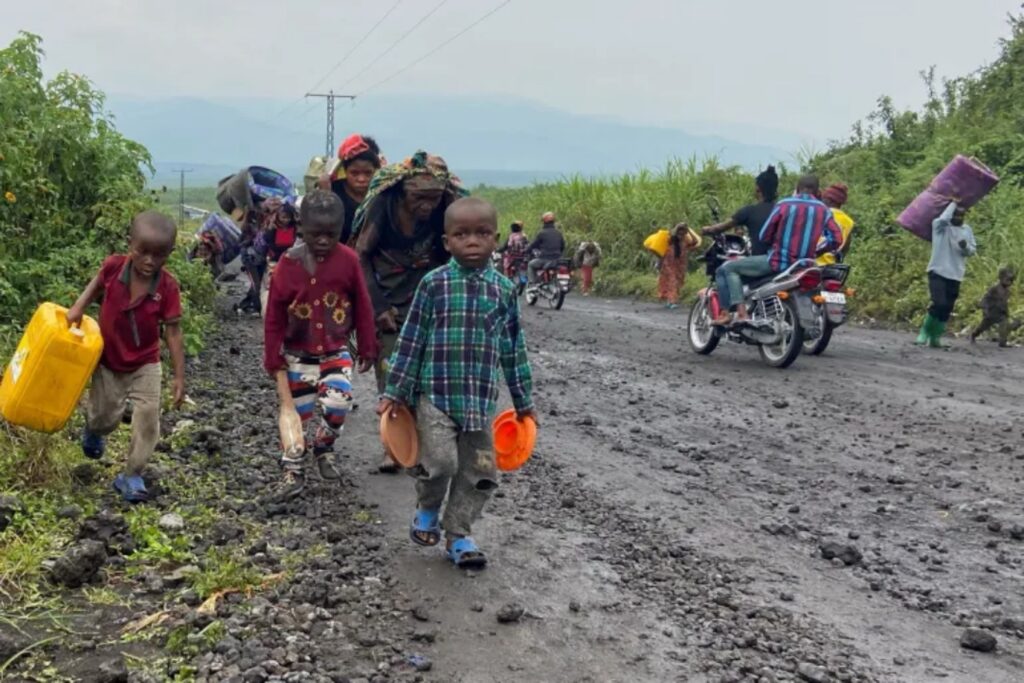Civilians carry their belongings as they flee after heavy gunfire that raised fears of M23 rebels advancing along a road from Sake near Goma in the North Kivu province of the Democratic Republic of Congo on February 9, 2023 [File: Reuters/Djaffar Sabiti]
“Our daily lives are powered by a human and environmental catastrophe in the Congo.” – Siddharth Kara, Cobalt Red: How the Blood of the Congo Powers Our Lives
In mid-December, I joined hundreds of thousands of people in central London calling for a ceasefire in Gaza. “We are united”, I told the crowd, “in our demand for peace and justice for the Palestinian people.”
Looking out to a sea of Palestinian flags, I was buoyed by the determination of ordinary people to show solidarity with those living under systems of violence and occupation. And I was moved by their willingness to prove how these systems were global in scope and scale. “I want us all to be active as well,” I concluded, “for peace and justice in the other wars that are fuelled by the arms trade – in Sudan, in Yemen, in West Papua, and the Congo.”
Against the global backdrop of deafening silence, the Democratic Republic of the Congo (DRC) is currently experiencing a harrowing humanitarian crisis. Nearly seven million people have been internally displaced in the DRC and 26 million need humanitarian aid. One in three children are out of school. Tens of thousands of civilians experience physical, sexual and gender-based violence, used as a tool of control and degradation. Meanwhile, the DRC remains one of the UNHCR’s most underfunded operations worldwide.
Today’s humanitarian crisis in the DRC did not emerge out of nowhere. It is an enduring legacy of colonial theft, violence and exploitation. During the Atlantic slave trade, more than five million Congolese people were captured, transported to the Americas and enslaved.
Descendants of those who evaded abduction and enslavement would endure the brutality of Belgian King Leopold II. Amassing enormous riches from slave labour, Leopold was responsible for the deaths of more than 10 million Congolese men, women, and children.
Independence in the 1960s was supposed to be a turning point; Patrice Lumumba was democratically elected on the promise of a free Congo. Threatening the interests of Western nations who sought to exploit his country, Lumumba was assassinated on January 17, 1961, with the support of the United States and Belgium.
For the Congolese people, colonial exploitation never ended. Today, the world relies on the DRC for natural resources, including diamonds, gold, timber, copper, oil, and gas. It produces 70 per cent of the world’s cobalt, an essential element in almost every lithium-ion rechargeable battery present in mobile phones and laptops many of us use every day.
These resources are largely controlled by foreign companies, which profit from resources that should otherwise be owned by the Congolese people. There is a reason why the DRC ranks 179 out of 191 in the Human Development Index – and it is not because the country lacks sufficient resources. It is because these resources are extracted to satisfy foreign corporate greed.
Bloated private corporations do not lose little sleep over the resultant poverty, environmental degradation, or displacement, as communities are forced from their land to make way for mining operations. The continued exploitation of resources has also created a playground for various armed groups, which have used violence to maintain control over mines in the DRC.
For decades, civilians have paid a particularly heavy price, most notably in the eastern regions of Ituri, North Kivu and South Kivu. Most recently, on June 11, 2023, an attack on the Lala refugee camp in Ituri province killed 46 people and displaced 7,800.
One of the most notable militia groups is the March 23 Movement (M23). Several human rights organisations, including Human Rights Watch and Amnesty International, as well as the United Nations, have reported that M23 has recruited child soldiers and committed unlawful killings, rape and other war crimes. The same human rights organisations have published evidence that M23 relies on financial and military support from DRC’s neighbour, Rwanda.
Congolese officials have repeatedly accused Rwanda of plundering their country’s natural resources. In an interview for the Financial Times, DRC’s finance minister, Nicolas Kazadi, said Kigali exported almost $1bn in gold, tin, tantalum and tungsten in 2022, despite having few of these mineral deposits of its own. The UN has previously documented how minerals mined in the DRC are smuggled into Rwanda where they are tagged as locally produced.
While Belgium, France, and Germany have condemned Rwanda’s support for M23, the United Kingdom government refuses to do so. How can they, when an honest recognition of these human rights abuses would expose the illegality of its flagship policy: to deport asylum seekers to Rwanda?
Continuing to double down on this policy in the face of court rulings, the government does not just show contempt for people risking their lives to reach a place of safety. It is actively putting them back at risk of persecution.
Our country has played an enormous role in generating the conditions for violence, discrimination and human rights abuses in the DRC, and indeed the Global South. Our government should recognise its responsibility to redress – not aggravate – this colonial trauma. That means, at the very least, fulfilling its international obligations towards the refugees, and their right to live in safety and peace.
Indeed, we all have a responsibility to put pressure on our government to do so in the name of decolonisation. Many of the resources that we enjoy daily – including the technology you might be using to read this very article – rely on the DRC’s exploitation. The least we can do is use this technology to effect change. That means writing to your local member of Parliament to ask them to demand that our government unequivocally condemns Rwanda for their support of M23, takes appropriate sanctions, and increases aid to the DRC.
Many of those in positions of power and influence pretend as if the plight of people in the Global South simply does not matter. Whenever there is a crisis, if it is in Africa, then it may as well not have happened.
How much more violence, death and displacement should the people of the DRC endure before the international community wakes up and takes action? The people of the DRC – just like the people of Palestine, West Papua, Yemen, Sudan and beyond – deserve to live in peace, justice and freedom. Their voices cannot be ignored any longer.
About the Author

Jeremy Corbyn
He is the former leader of the UK Labour Party and a human rights advocate.
